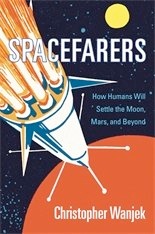I am an author and health writer based in Baltimore. On this site you will find links to most of my recent health news articles as well as my three books: Bad Medicine, Food at Work, and Spacefarers.
Follow me on Twitter at @wanjek for a critical take on health and science news.
Spacefarers is taking off! Here’s what reviewers are saying:
-
 “Spacefarers is the best book I’ve read on space exploration since Isaac Asimov.” — Michael Shermer, publisher of Skeptic magazine
“Spacefarers is the best book I’ve read on space exploration since Isaac Asimov.” — Michael Shermer, publisher of Skeptic magazine -
 “Spacefarers is at once delightfully imaginative and highly practical.” — Science News
“Spacefarers is at once delightfully imaginative and highly practical.” — Science News -
 “The great thing about this book is its balance between optimism and realism, between respect and frivolity.” — E&T Magazine
“The great thing about this book is its balance between optimism and realism, between respect and frivolity.” — E&T Magazine -
 “…an important perspective to the conversation about our future in space.” — Science
“…an important perspective to the conversation about our future in space.” — Science -
 “…a thought-provoking discussion of the history of the space program, the pros and cons of space travel, and the economic, physical, and biological issues involved.” — Physics today
“…a thought-provoking discussion of the history of the space program, the pros and cons of space travel, and the economic, physical, and biological issues involved.” — Physics today

More than fifty years after the Apollo 11 moon landing, why is there so little human presence in space? Will we ever reach Mars? What will it take to become a multiplanet species, colonizing the solar system and traveling to other stars? Spacefarers meets these questions head on. While many books have speculated on the possibility of living beyond the Earth, few have delved into the practical challenges or plausible motives for leaving the safe confines of our home planet. Christopher Wanjek argues that there is little doubt we will be returning to the Moon and exploring Mars in the coming decades, given the potential scientific and commercial bonanza. Private industry is already taking a leading role and earning profits from human space activity. This can be, Wanjek suggests, a sustainable venture and a natural extension of earthbound science, business, and leisure. He envisions hotels in low-earth orbit and mining, tourism, and science on the Moon. He also proposes the slow, steady development of science bases on Mars, to be followed by settlements if Martian gravity will permit reproduction and healthy child development.
An appetite for wonder will take us far, but if we really want to settle new worlds, we’ll need the earnest plans of engineers, scientists, and entrepreneurs. Wanjek introduces us to those planners, who are striving right now to make life in space a reality.

Check out that book cover, which is the same photo as on the top of this site. Lunchtime hasn’t gotten much better for construction workers since Charles C. Ebbets snapped this 1932 photo, “Lunch atop a Skyscraper,” taken during construction of the RCA Building in New York. Read more and download a free PDF of this 460-page hardback, courtesy of the International Labour Organization, by clicking here.

